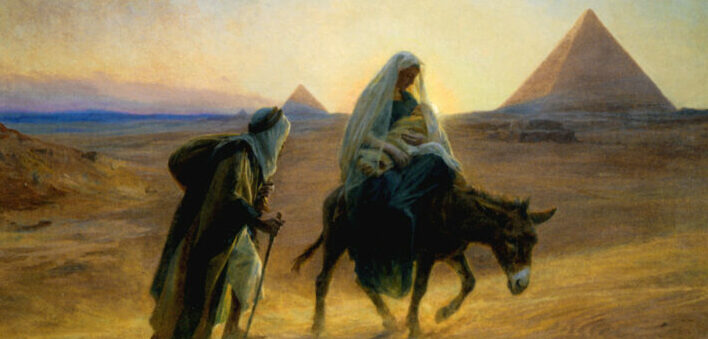Commentary on Isaiah 63:7-9
“It was no messenger or angel but his presence that saved them.”1
Isaiah seeks to get his community in formation by remembering YHWH’s actions in the age of salvation, the age of Moses and the Exodus, of exile and return.
Celebrating God in the midst of us
Long before the birth of Jesus, Isaiah shared this good news with a people losing memory of how YHWH works in the world—in our midst.
Not from afar. Not sending a herald to come down while YHWH remains at a distance. The prophet is performing a profoundly liturgical act in this moment, using words to cause the people to remember how YHWH stood with them in seasons of crisis and eventually saved them.2
Remembering is the heart of worship for Israel. Amnesia leads to all sorts of spiritual and political crises. Psalms are liturgical songs remembering YHWH’s saving acts, for both the people to hear and even for YHWH to hear, when it seems as if either party is at risk of forgetting the covenant that binds people and Creator together. And so, the prophet calls out in verse 7: “I will bring to remembrance the loving kindness of YHWH!”
YHWH’s hesed must be imaged by the preacher. To tell people “God’s love is steadfast and enduring” won’t move the congregation in the same way that a story about how God persistently went after someone in the midst of crisis would. Again, as you preach from Isaiah, the prophet who shared not simply sayings, but a vision, do your best to add flesh, color, and vitality to your words.
Why does the prophet need to bring this to remembrance after the people have arrived at home?
Spiritual homelessness
Over the last few weeks in the lectionary we have shifted from first Isaiah now to third Isaiah, a timeline of roughly two centuries. And contexts have shifted along with us. Those who were in exile have now returned to a spiritual home that was never physically a home, only known through stories and songs. The people are unsure of who and how to be in Zion. How can they reclaim their identity? Through worship, through remembering, the prophet seeks to reorganize a people seeking reconnection to their physical/spiritual homes. For all of us, remembering and repenting in light of that memory of God’s hesed paves the path for our wandering souls to journey home.
But who are YHWH’s people, really?
In these three verses, and throughout the “sermon-prayer” in this chapter of Isaiah, the theological message that is meant to draw the people to worship YHWH is that YHWH saves the people by being present with them.3
But who are “the people” YHWH saves?
This is what the series of interruptions addresses, in the genre of lamentations, in the remaining verses of this chapter. Perspectives shift with each line: Nationalists, Zionists, Israelites, Jerusalemites, and other people of the land seek to secure YHWH’s favor and action for their own sectarian interests rather than for the sake of “all.”4 As Watts summarizes it in the World Biblical Commentary:
There are those who would pray exclusively for Jerusalem. There are others that would pray for redemption for all twelve tribes of Israel. There are others who feel that only descendants of the original covenant community should receive God’s attention and blessing. There are activists that demand a return to political power and military strength that will win the respect of the nations.5
This is spiritual amnesia in action. Each party forgets the earlier visions of Isaiah, which paint a portrait of shalom. Wholeness and holiness in the land that radiates out to other lands and draws all nations near.
This portion of the chapter is not included in the pericope. But it may be important in your preaching and in your context. How do we still limit the vision of prophets with sectarian prayers?
Sermon image
In this image of Carl Miles’s sculpture, “God’s hand,” there is promise and challenge.6 The promise is that God is a God in our midst, that we are creatures held in the Creator’s hand. But there is a challenge as well. If we only see ourselves in that hand, if we only see people who look like and think like and vote like and speak like us in that hand, then we miss out on the vision of Isaiah and the vision of Christ as well.
Remembering the Christmas story
Do not rush to the Christmas Story and the way in which it makes flesh and brings vitality to the sermon-prayer of Isaiah. But, after giving Isaiah’s concerns attention, do eventually tell the story—of how God’s very presence inhabited the vulnerable, fragile body of a newborn. Tell the story of how the salvation offered for this Messiah was truly for all people, challenging notions of us vs. them and sibling rivalry.
But let us not make the mistake of Isaiah’s audience, as they thought “only in terms of what God did once long ago,” and so they only “pray for a return to that kind of action” as they can easily imagine it.7 Consider how the story of Christmas continues today in ways beyond our imagination: through every disciple who seeks to bear Christ out into the world and through ordinary theotokos, God-bearers, who bring the words “justice” and “righteousness” to action in the world.
Remember the story of Jesus—not for the sake of comforting nostalgia only, but for the sake of a world still searching for home, wholeness, and holiness and a people still needing to get in formation.
Notes:
- Commentary first published on this site on Dec. 29, 2019.
- John D. W. Watts. World Biblical Commentary, Volume 25: Isaiah 34-66, Revised Edition (Grand Rapids, MI: Thomas Nelson, Inc. 2005), 329.
- Watts, 328.
- Watts, 330.
- Watts, 337.
- Carl Miles. “God’s Hand,” from Art in the Christian Tradition, a project of the Vanderbilt Divinity Library, Nashville, Tenn. http://diglib.library.vanderbilt.edu/act-imagelink.pl?RC=55402.
- Watts, 337.


January 1, 2023